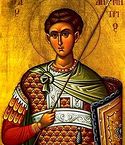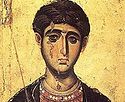

| Previous day | Next day |
| Old Style
October 26
|
Tuesday |
New Style
November 8
|
| 22nd Week after Pentecost. Tone 4. | No fast.
|
![]() Holy and Glorious Great-martyr Demetrius the Myrrh-gusher, of Thessalonica (306). Commemoration of the Great Earthquake at Constantinople in 740 (740).
Holy and Glorious Great-martyr Demetrius the Myrrh-gusher, of Thessalonica (306). Commemoration of the Great Earthquake at Constantinople in 740 (740).
Martyr Lupus, slave of St. Demetrius of Thessalonica (306). St. Athanasius of Medikion Monastery (814). St. Theophilus of the Kiev Caves, archbishop of Novgorod (1482). St. Demetrius of Basarabov in Bulgaria (1685). St. Anthony, bishop of Vologda (1588). St. Alexander (Okropiridze), bishop of Guria and Mingrelia, Georgia (1907).
St. Cedd, bishop of Lastingham (664). St. Eata, bishop of Hexham and abbot of Lindisfarne (686). New Martyr Ioasaph, monk, of Mt. Athos, disciple of St. Niphon, patriarch of Constantinople (1536).
Repose of Hieroschemamonk Nilus of Kryuchi (1924), Elder Ignatius the Bulgarian, of Mt. Athos (1927), and Matushka Olga (A’rrsamquq) Michael of Kwethluk, Alaska (1979).
Thoughts for Each Day of the Year
According to the Daily Church Readings from the Word of God
By St. Theophan the Recluse

Tuesday. [I Thess. 1:6-10; Luke 11:1-10]
The Lord gave a common prayer for everyone, combining in it all of our needs, spiritual and bodily, inner and outer, eternal and temporal. But since it is impossible to include everything which one has to pray to God about in life in only one prayer, a rule is given after the common prayer for private requests about something: Ask, and it shall be given you; seek, and ye shall find; knock, and it shall be opened unto you. So it is done in the Church of God: Christians pray in common about common needs, but each privately sets his own needs and requirements before the Lord. We pray in common in churches according to established rites, which are nothing other than the Lord’s Prayer which has been explained and presented in various ways; while privately, at home, everyone asks the Lord about his own things in whatever way he can. Even in church one can pray about one’s own concerns, and at home one can pray with a common prayer. We must concern ourselves about only one thing: that when we stand at prayer, at home or in church, we have true prayer in our soul, true turning and lifting up of our mind and heart to God. Let everyone do this as he is able. Do not stand like a statue, and do not mutter the prayers like a street organ wound up, playing songs. As long as you stand like that, and as long as you mumble the prayers, you are without prayer, the mind wandering and the heart full of vain feelings. If you already stand in prayer and are adjusted to it, is it difficult for you to draw your mind and heart there as well? Draw them there, even if they have become unyielding. Then true prayer will form and will attract God’s mercy, and God’s promise to prayer: ask and it will be given, it will be fulfilled. Often it is not given because there is no petition, but only a posture of petitioning.
Articles
 Commemoration of the Great Earthquake at ConstantinopleIn 740, at the time of the iconoclast emperor Leo the Isaurian, there was a terrible earthquake at Constantinople. |
 Martyr LupusThe Martyr Lupus lived at the end of the third century and beginning of the fourth century, and was a faithful servant of the holy Great Martyr Demetrius of Thessalonica (October 26). |
 Venerable Athanasius of Medikion MonasterySaint Athanasius of Medikion Monastery (+ ca. 814) loved the monastic life and secretly left his parental home, but was forcibly returned by his father. |
 St. Demetrius of BasarabovSaint Demetrius of Basarabov in Bulgaria lived in the wilderness as an ascetic near the city of Ruschuk, Bulgaria. |
 Monastic Martyr Joseph of Dionysiou, Mount AthosHe was an iconographer, and he painted the icon of the holy Archangels on the iconostasis of Dionysiou’s main church. |








